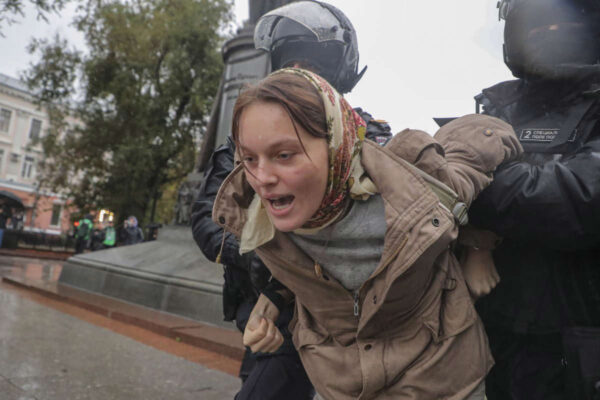
Putin signs laws cracking down on military dissent, easing citizenship applications for foreign fighters
By Adam Schrader
Russian President Vladimir Putin signed a series of laws on Saturday and Sunday cracking down on military dissent and providing incentives for those who volunteer or are conscripted to serve amid his grinding war in Ukraine.
Putin last week announced that Russia would increase its military conscription to support his invasion of Ukraine even as the country has reportedly failed to pay military reservists and volunteer units fighting in the war with troops continuing to suffer eroding professionalism.
In a law signed by Putin on Saturday, Russia strengthened the criminal liability for soldiers who commit “crimes against military service” include failing to follow orders and desertion during the “period of mobilization or martial law” or in wartime conditions.
Soldiers who commit such crimes can now 10 years in prison while those who commit “especially grave crimes” can have their imprisonment replaced with “forced labor or another milder form of punishment” after two-thirds of their prison sentence has been served, the Kremlin said in a statement.
Russia also introduced criminal liability for military personnel who voluntarily surrender as well as for looting during armed conflict and combat operations, in an apparent attempt to tamper down on looting Ukraine such as the theft of Scythian gold from a museum in Melitopol in April.
The law also established criminal liability for defense contractors who fail to deliver on state contracts for defense orders, punishable by hefty fines or sentences of up to eight years in prison.
However, Putin also signed a law allowing full-time and part-time students to defer conscription if they are enrolled in a “nationally accredited vocational training and higher education program” at a state university, according to a statement from the Kremlin.
Putin signed yet another amendment to federal law Saturday easing applications for citizenship for foreigners who contract to fight in the Russian Armed Forces for at least a year and reducing the length of terms for foreign fighters from five years to one year.
The Russian government on Saturday also expanded its list of foreign countries and territories that “conduct unfriendly actions” with regard to Russia, adding the islands of Guernsey and Man which supported Britain’s sanctions against the country, according to a news release.
Earlier last week, Russia had added Greece, Denmark, Slovenia, Croatia and Slovakia to the list which restricts the ability of “unfriendly countries” to hire people living in Russia for their embassies, consulates and representative offices of their governments.
The Institute for the Study of War, a think tank based in Washington, D.C., said in an analysis Saturday that responsibility for the mobilization of troops “appears to be divided and complex” which may be adding to “confusion” and “disorganization” among top Russian officials.
Additionally, Russian forces “may be preparing to forcibly mobilize Ukrainian prisoners of war to fight for Russia” which would constitute a violation of the Geneva Convention.
Protests against the conscription efforts have led to mass arrests in Russia with 745 people detained Saturday, according to OVD Info — an independent human rights project in Russia.
In video footage posted on YouTube, riot police could be seen approaching a group of protesters holding hands in a circle in the Siberian city of Novosibirsk.
On Sunday, another 828 people were detained in 35 cities including 393 arrested in Moscow alone.
Data from OVD Info shows that 1,330 people have been arrested for protesting since Putin announced the mobilization efforts on September 21. Almost all of those detained in protests this past week have been found guilty.
Male protesters who have been detained have reportedly been given summonses conscripting them into the military.
OVD Info has recorded at least 17,000 arrests for street protests as well as anti-war posts made online since Russia invaded Ukraine in February.
The latest conscription efforts as well as crackdowns on protesters and deserters have caused Russian men to try to flee the country, including a former journalist who was arrested at the border with Kazakhstan.
Tamila Tasheva, Ukraine’s presidential permanent representative in Crimea, said on Ukraine’s Parliament TV on Sunday that Crimean Tartars “are forced to leave Crimea, which they have not done since 2014.”
“Currently, thousands of Crimean Tatars, including their families, are leaving Crimea through the territory of Russia mostly for Uzbekistan, Kazakhstan,” Tasheva said, according to CNN.
“Since Crimean Tatars do not have foreign passports, only internal Russian passports. Therefore, Crimean Tatars can go only to those countries where citizens of Russia do not need a visa.”
Source: UPI
